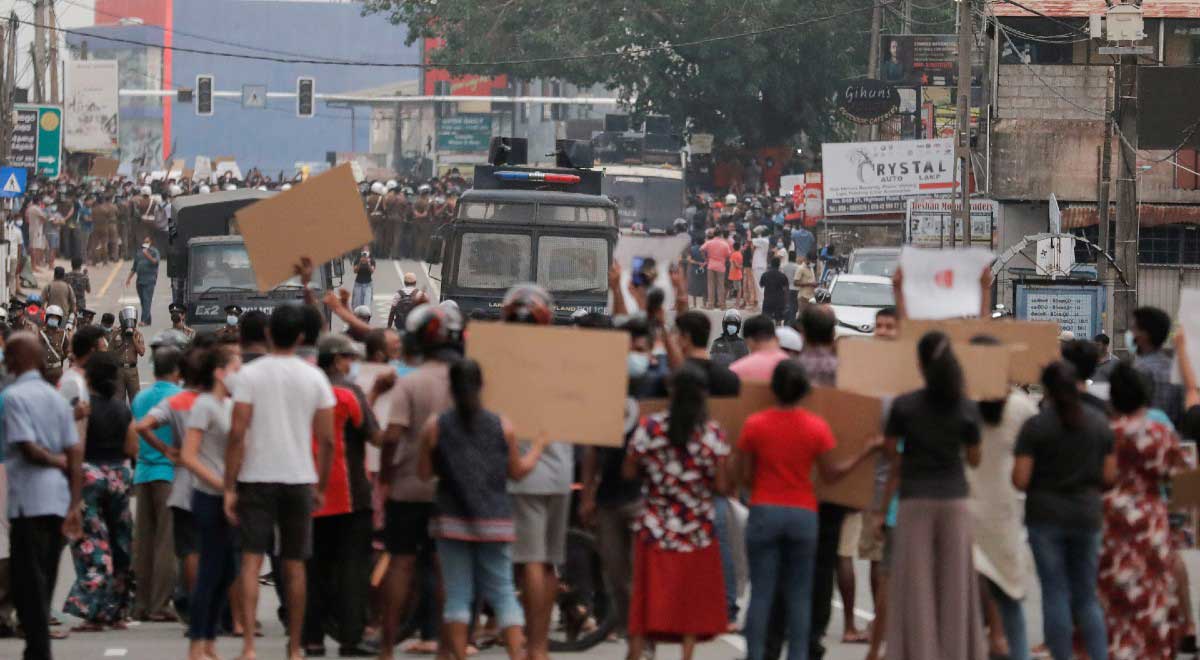Sri Lanka’s prime minister on Wednesday offered to hold talks with protesters who were demanding the government’s resignation over its inability to deal with the economic crisis, while the opposition threatened to file a vote of no confidence in parliament.
The island nation of 22 million is facing its worst financial crisis since independence in 1948. The lack of foreign exchange stops the import of fuel and medicines and causes many hours of power outages.
Thousands took to the streets, many of whom went on strike in the capital, Colombo, to denounce the government of President Gotabay Rajapaksa and his older brother, Prime Minister Mahinda Rajapaksa.
The Prime Minister is ready to negotiate
“The Prime Minister stands ready to begin negotiations with the protesters at Halle Face Green,” the Prime Minister’s Office said in a statement, citing the protest site, which has become a center of discontent.
“If the protesters are ready to discuss their proposals to solve the problems that the nation is currently struggling with, the prime minister is ready to invite their representatives for negotiations,” the department added.
Some protesters in the tent city, which has grown in recent days to include food stalls, medical facilities and phone charging stations, said this week they would only leave if Rajapaksa relented. Sri Lanka is expected to start negotiations on a loan program with the International Monetary Fund (IMF) next week after months of delays due to the deepening crisis.
Suspended debt repayment
On Tuesday, the head of the central bank said he was suspending the repayment of external debt and directing shrinking foreign exchange reserves to import essentials. JP Morgan analysts stress that political instability is a major risk as the government seeks outside help.
The main opposition alliance, Samaga Jan Balawegay (SJB), has announced that it will give the president and prime minister a week to step down before submitting a vote of no confidence in parliament.
“The president and the prime minister should resign,” Eran Vikramaratne said, adding that the opposition has a sufficient number of deputies in parliament.
The government says it has a majority in the 225-seat parliament scheduled for next week, although more than two dozen deputies left the ruling coalition last week and declared their independence.
The crisis stems from mismanagement of public finances, which critics say was exacerbated by tax cuts introduced by the government just before the start of the COVID-19 pandemic.
The system is falling apart
Sri Lanka’s healthcare system is on the brink of collapse under the weight of the island nation’s worst economic crisis. In addition to the lack of necessary medicines, some procedures and tests have also been suspended. Due to a lack of foreign exchange, the government of President Gotabai Rajapaksa is unable to import essential goods, including medicines and fuel, leading to crippling power outages.
Health officials in Sri Lanka say they have never seen a health care system in such a bad state before. An internal memo from a major public hospital in Colombo states that only emergency and cancer surgeries will be performed from April 7 due to a shortage of surgical equipment.
Broken economy
The economy, which relies heavily on tourism, has been devastated by the COVID-19 pandemic and hit by a post-war oil surge in Ukraine that has made importing enough fuel expensive. Some analysts have also criticized the Rajapaksa administration for its decision in 2019 to drastically cut taxes and delay negotiations with the International Monetary Fund (IMF). These negotiations are currently ongoing. A close associate of Rajapaksa previously said the tax cuts were intended to stimulate the economy, but then the COVID-19 crisis followed. Sri Lanka currently has only $1.93 billion in foreign exchange reserves, less than the equivalent of monthly imports.
The Sri Lanka Medical Association, the country’s oldest professional medical organization, wrote to Rajapaksa last week warning that even emergency treatment may need to be stopped in the coming days. “This will lead to a catastrophic number of deaths,” the magazine wrote.

